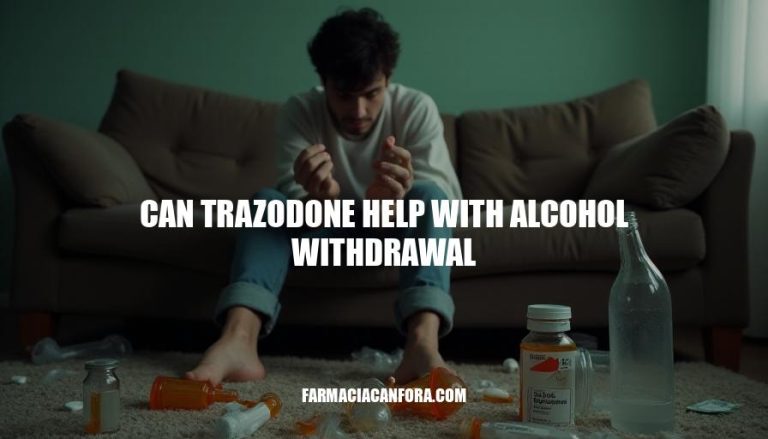


Alcohol withdrawal can be tough on the body and mind. People who have a dependence on alcohol might experience headaches, anxiety, insomnia, sweating, nausea, fast heart rate, tremors, confusion, hallucinations, seizures, and even delirium tremens in severe cases.
Recovery from alcohol dependence is not just about feeling better physically – it’s also about dealing with emotional struggles, sleep problems, and mood swings. Many people have trouble sleeping and feel anxious, which can make it hard to stay sober.
Doctors often need to step in to help manage withdrawal symptoms and support long-term recovery.
Can trazodone help with alcohol withdrawal? Trazodone is usually used as an antidepressant, but it has a calming effect that might be helpful during withdrawal. It can help people sleep better and feel more stable emotionally.
However, its effectiveness varies, and doctors need to supervise its use to make sure it’s safe.
12
Trazodone is classified as a serotonin antagonist and reuptake inhibitor (SARI), primarily used to treat major depressive disorder, anxiety disorders, and insomnia. It modulates serotonin levels in the brain, which contributes to its antidepressant and sedative effects. The drug exhibits antiserotonin activity and α-adrenergic blocking effects, distinguishing it from other antidepressants.
Its pharmacokinetic profile includes a bioavailability of approximately 65%, extensive liver metabolism, and an elimination half-life ranging from 4 to 15 hours for immediate-release formulations.
The question of “can trazodone help with alcohol withdrawal” is explored in various studies. Alcohol withdrawal symptoms often include anxiety, insomnia, and mood disturbances, which trazodone’s pharmacological properties may address. Some research suggests trazodone can be beneficial in managing post-withdrawal symptoms, particularly sleep disturbances and cravings.
A case study reported successful treatment of acute alcohol withdrawal symptoms with trazodone, even when other medications like diazepam and clomethiazolum failed. However, controlled trials are necessary to establish its efficacy in broader clinical applications.
Despite its potential benefits, trazodone’s interaction with alcohol presents risks. Both substances depress the central nervous system, which can lead to excessive sedation, impaired coordination, and increased risk of overdose.
Mixing trazodone with alcohol may amplify side effects such as dizziness, confusion, and respiratory distress. Therefore, while trazodone may aid in alcohol withdrawal management, its use should be carefully monitored by healthcare professionals.
Further research is needed to determine trazodone’s definitive role in alcohol withdrawal treatment. Existing studies indicate promise, but comprehensive clinical trials are required to validate its effectiveness and safety in this context.
1en.wikipedia.org2go.drugbank.com3link.springer.com4alcoholawareness.org5www.thieme-connect.com
Trazodone, an antidepressant medication, may be beneficial in managing symptoms associated with alcohol withdrawal, such as anxiety, insomnia, and mood disturbances.
Its calming effect can help individuals sleep better and feel more emotionally stable during the recovery process.
Research suggests that trazodone can be effective in treating post-withdrawal symptoms, particularly sleep disturbances and cravings. A case study reported successful treatment of acute alcohol withdrawal symptoms with trazodone, even when other medications failed. However, controlled trials are necessary to establish its efficacy in broader clinical applications.
Despite its potential benefits, trazodone’s interaction with alcohol presents risks, including excessive sedation, impaired coordination, and increased risk of overdose. Mixing trazodone with alcohol may amplify side effects such as dizziness, confusion, and respiratory distress.
Healthcare professionals should carefully monitor individuals using trazodone for alcohol withdrawal management due to the potential risks associated with its interaction with alcohol. Further research is needed to determine trazodone’s definitive role in alcohol withdrawal treatment.
Individuals exploring treatment options for alcohol dependence should consult healthcare professionals before using trazodone or any other medication. A comprehensive treatment plan, including medical supervision and support, is essential for successful recovery from alcohol dependence.